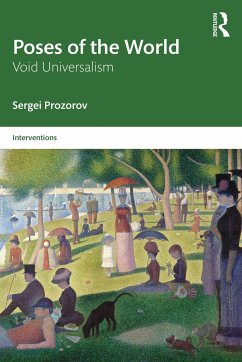Poses of the World develops a theory of the pluralistic coexistence of politics with aesthetic, scientific, ethical and economic procedures that have sought to influence, dominate or even replace politics.
We are accustomed to saying that everything is political. It is true that politics has throughout history ventured into the domains that used to be non-political, be they art, science or economy. However, rather than being totally dominated by politics, our societies are marked by the coexistence of diverse procedures, whose logics are distinct but nonetheless remain in contact, ranging from frontal conflict to lasting syntheses. This book develops a theory of this pluralistic coexistence. It builds upon the findings of the first two volumes of Void Universalism to outline an account of pluralism that affirms the incommensurable character of the procedures that regulate the manners of our being and acting in the world. Neither reducible to nor insulated from each other, politics, ethics, art, economy, science and numerous other procedures persist in errancy without ever cohering into any overarching unity. The book demonstrates how the abandonment of the aspiration for such coherence opens up new perspectives on the key sociopolitical debates of our time, from the critique of neoliberalism to concerns over cancel culture.
Systematic and accessible, this volume will be of interest to students and scholars of political science, philosophy, sociology, anthropology and cultural studies as well a wider readership beyond academia.
We are accustomed to saying that everything is political. It is true that politics has throughout history ventured into the domains that used to be non-political, be they art, science or economy. However, rather than being totally dominated by politics, our societies are marked by the coexistence of diverse procedures, whose logics are distinct but nonetheless remain in contact, ranging from frontal conflict to lasting syntheses. This book develops a theory of this pluralistic coexistence. It builds upon the findings of the first two volumes of Void Universalism to outline an account of pluralism that affirms the incommensurable character of the procedures that regulate the manners of our being and acting in the world. Neither reducible to nor insulated from each other, politics, ethics, art, economy, science and numerous other procedures persist in errancy without ever cohering into any overarching unity. The book demonstrates how the abandonment of the aspiration for such coherence opens up new perspectives on the key sociopolitical debates of our time, from the critique of neoliberalism to concerns over cancel culture.
Systematic and accessible, this volume will be of interest to students and scholars of political science, philosophy, sociology, anthropology and cultural studies as well a wider readership beyond academia.

